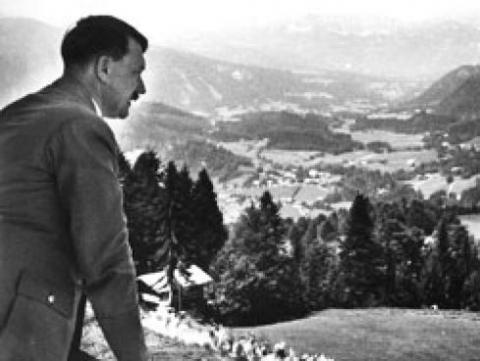"Hitler's Table Talk" Study Hour: Episode 26
Sept. 3, 2014

Hitler takes in the view from the terrace of his mountaintop home, the Berghof. He says he always found it difficult to leave there.
Ray Goodwin and Carolyn Yeager read and comment on the Feb. 6th-17th, 1942 dinner table monologues by the German Leader, as taken down by trusted aide, attorney Heinrich Heim. Included in this episode:
- Commentary on Britain, France and Japan, plus Germany's best engineers come from Swabia and Württemburg;
- More on criminals and the judicial system, and Church doctrines that oppose truth;
- Various types of government - monachy vs republic;
- A loyal state church, the beauties of Obersalzberg;
- The kind of aircraft Germany needed, and some of the "luck" involved in the Narvik victory;
- More humorous stories of Hitler's motor cars and his drivers;
- The Duce should get rid of the monarchy, and how Jews interfere with the natural order.
The edition of Hitler's Table Talk being used was translated by Norman Cameron and R.H. Stevens, published by Enigma Books, New York, and can be found as a pdf here.
Category
"Hitler's Table Talk" Study Hour, Adolf Hitler, Jews, World War II- 1593 reads










Comments
Violence, Cars, Parenthesis
Violent games or what was it? Violence and force is the same word in German. Gewalt, gewaltig as adjective may mean violent or impressive or unforgettable etc. Maybe powerful comes close. I bet, this is an out of context translation.
Driving a car back then was like hitting the gym today, while reading a book exercising, especially those big old Mercedes' without servo-steering wheels and computerized brakes etc. That's why a driver had to be very talented and cut out for the task. Today, a driver is rather replaceable with smaller, semi-automatic cars. Even today's biggest cars, dwarf those of old times.
Putting quotes in parenthesis may reflect that Hitler used English terms. Fair Play is a very common term in today's German. Hitler might have said "Swabia" instead of Schwaben or Schwabeland, referring to how German-Americans would identify themselves. Parenthesis are also often used to be ironic. A soon "to be published book" might not have even been written yet at all.I don't know for certain either, of course.
Great show.
To Markus
It was violent exercise.
We're not talking about quotes, only parentheses. () I think you have the one mixed up with the other.
The parentheses question
I looked at everything in parentheses from the beginning of February and didn't find anything until Feb. 3rd. Then there were several instances. I have listed them all below. It leads me to the conclusion that it is the translators who have added the parentheses, but not necessarily always the words that are within them. I see no reason to think it was Bormann.
Since in some cases they have put Hitler's words in parentheses, but in others their own, it leads to confusion. I think it's really unprofessional, but probably the fault of Editor Hugh Trevor-Roper. Below, I note after each use to whom I think the words belong.
Feb. 3-4
I was going to Bayreuth through the Fichtelgebirge (Spruce forest). Translators
Landsberg, everybody wept (the Mufti and the other members of the prison staff) — but not I ! Translators
Hess had opened the box with his own key, and had shut it again (replacing the seals), ... Translators
Feb. 7th
The people in the United States who were originally responsible for the development of engineering were nearly all of German stock (from Swabia and Württemberg). Translators or possibly Heim
... the English are beginning to demand that recourse should be had to the German methods (which, for my part, I find insufficiently draconic for the period). Hitler said it, the translators put it in parentheses
Feb. 8th
... it's only by directly influencing people that he can exercise an influence (provided, moreover, that he's clever enough) on the political level. Hitler's words, put in parentheses by the translators
Feb. 9th
The last thing these English know is how to practise fair play (phrase in English in the original). Translators
If I had a bomber capable of flying at more than seven hundred and fifty (kilometres) an hour, ... Translators
On the day when the gentry (English word, in the original) were deprived of their hydrotherapy, Translators
Feb. 17th
In 1925 I wrote in Mein Kampf (and also in an unpublished work) that world Jewry saw in Japan an opponent beyond its reach. Translators
(Hitler would not have mentioned his "unpublished" work and neither would Bormann, since it was unpublished for a reason. Heim would not have dared.)
What do YOU think?
Transformative Shows
Listening to this show has really been an eye opener for me; in this episode Hitler looks critically at church and state and further expounds on the Jewish question. The way I viewed Hitler before listening to this show and the way I view him now has been totally transformed. Carolyn and Ray would give any top notch college professor a run for his/her money and they do it for free.